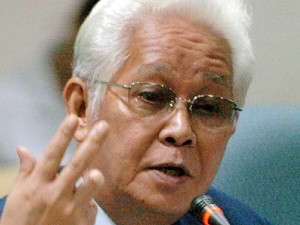MANILA, Philippines—The first eight winning senators could be proclaimed within 48 hours from the close of the voting on Election Day, Commission on Elections (Comelec) chair Sixto Brillantes Jr. said on Tuesday.
Brillantes said that all the 12 winning senatorial candidates might even be proclaimed within two days after the elections in case of large vote margins among the last four senators in the “Magic 12.”
“(For the) senatorial (race), we expect eight at the very least in 48 hours. That’s the minimum. It could be more,” Brillantes said in an interview at the launching of the Parish Pastoral Council for Responsible Voting (PPCRV) unofficial parallel count in Manila.
“We could declare all the winners depending on margin between number 12 and number 13. If the margin is big, we might proclaim all the winners,” he said.
“If the difference is very small, then we might have to defer at least number 11, 12 at 13,” he added.
Brillantes said the Comelec would convene as the National Board of Canvassers at around 6 p.m. on May 13 to begin canvassing the results of the senatorial and party-list elections.
“We will convene at 6 pm for the initial convening but we will start at 7 p.m….or 8 p.m. at the PICC (Philippine International Convention Center),” he said.
Brillantes said that precincts that close early could immediately transmit their results to the PICC for canvassing.
“We will know who will be the first to send in their results,” he added.
Brillantes said the PPCRV, which has been accredited as a Comelec citizens’ arm, would also conduct an unofficial parallel count at the Pope Pius XIII Catholic Center in Paco, Manila.
“They were the first to be accredited and they have been accredited for a long time. They will have the fourth copy of the election returns,” he said.
The Comelec chief said that other citizens’ arms—the National Movement for Free Elections (Namfrel) and One Vote, would also receive copies of the election returns but they have not been accredited to conduct a parallel count.
“Namfrel is not insisting that it get the fourth copy. In fact, they are already happy that they have a copy (of election returns),” Brillantes said.
Meanwhile, the Compact for Peaceful and Democratic Elections (Compact) will deploy 30 international election observers in six separate areas around the country to monitor “iconic electoral battles.”
“Our 2013 international election observers have shown great interest in monitoring iconic electoral contests between those that proclaim to be on the side of reforms and those that are widely associated with traditional and patronage politics,” Arnold Tarrobago, Compact national coordinator, said in a statement.
He said the observers specifically wanted to monitor local electoral battles between Pampanga Governor Lilia Pineda and former Governor Ed Panlilio, Pampanga Rep. Gloria Macapagal Arroyo and former Pampanga provincial administrator Vivian Dabu for the second congressional district of Pampanga, lawyer Leni Robredo and Nelly Villafuerte for the third congressional district of Camarines Sur, Autonomous Region in Muslim Mindanao (ARMM) officer-in-charge Mujiv Hataman and Pax Mangudadatu and the three-way fight between Fr. Leo Casas against the powerful Kho and Lanete clans for the governorship of Masbate.
“They are very interested in how these local electoral contests will play out three years into the term of President Aquino, who himself won the 2010 election under the banner of political reforms,” Tarrobago said.
Dubbed as the “International Team Bantay,” Tarrobago said its 2013 International Observers Mission (IOM) would have parliamentarians, academics, youth and student leaders, as well as respected leaders from foreign political parties, media organizations and NGOs.
Tarrobago said COMPACT, which has fielded successive IOMs during the 2004, 2007 and 2010 elections, would have election observers for the midterm election hailing from 16 different countries; namely, Sweden, Denmark, USA, Japan, Australia, Germany, Spain, Burma, The Netherlands, Thailand, Afghanistan, Mongolia, Indonesia, Pakistan, Nepal, and Sri Lanka.
Tarrobago said the observers would be grouped according to their expertise and experience in election monitoring.
Six IOM teams, along with representatives of their local host organizations, will be deployed to Cagayan, Pampanga, Camarines Sur, Masbate, Cebu, and the ARMM.
“Aside from iconic electoral battles, we consciously chose these areas because they had the following factors: history of election-related violence, fraud and political clans; presence of capable local civil society organizations doing election monitoring; and security and safety of the foreign election observers,” Tarrobago said.
“In other words, these areas displayed a wide gamut of issues and conditions which we often see in Philippine elections,” he added.
The observers’ mission, which will last for 10 days, will include a general orientation, press briefing, and planning for local monitoring, according to Tarrobago.
“They will stay for five days, including Election Day, in the local areas. Prior to the elections, the international observers are given an in-depth orientation on the local political situation, and are accompanied by local host organizations in conducting interviews with different political players and election stakeholders,” Tarrobago said.
After the elections, the international observers will return to Manila for “experience sharing” and collective crafting of the monitoring report.
The observers’ mission report will be presented to the public in general, and to concerned government agencies, as well as the diplomatic corps, according to Tarrobago.
First convened in 2004, Compact is a consortium of non-government and civil society organizations that aim to address the growing incidence of election-related violence, allegedly committed by both state and non-state actors.
Its 2013 National Convenors include: Ramon Casiple (Institute of Political and Electoral Reform/IPER); Joy Aceron (Team Democracy, Ateneo School of Government/ASOG); Gladstone Cuarteros (La Salle Justice and Peace Commission/LSJPC); Pastor Al Senturias (Cosmopolitan Church/UCCP); Robert Francis Garcia (Peace Advocates for Truth, Justice and Healing/PATH); Earl Parreno (SEED); lawyer Zainuddin Malang (Mindanao Human Rights Action Center/MinHRAC); Roberto Verzola (SRI-Pilipinas Network); Geline Avila (COMPACT IOM 2010); and Rueben Serrano (Student Council Alliance of the Philippines/SCAP).
